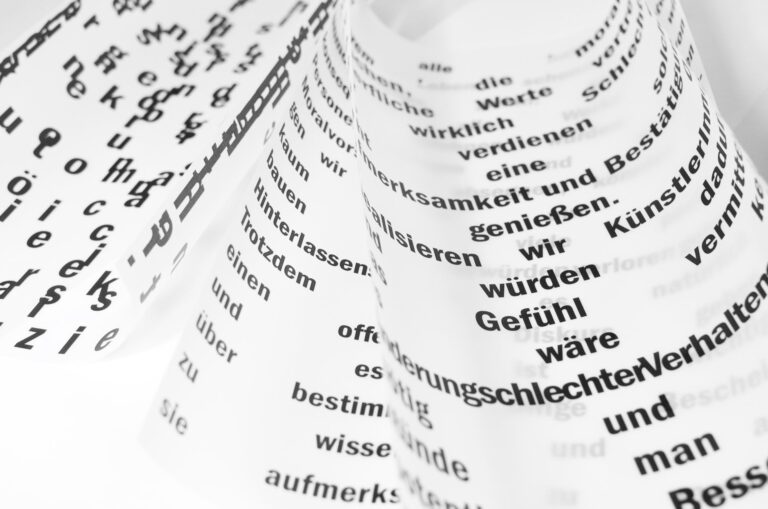The Art of Letter Writing in Germany: How to Send a Thoughtful Message
Letter writing has long been an important part of German culture, serving as a means of communication and expression. In a world dominated by technology and instant messaging, the art of letter writing may seem outdated to some. However, in Germany, it is still highly valued and cherished. In this blog post, we will explore the significance of letter writing in German culture and provide tips on how to write a thoughtful and meaningful letter.
The Importance of Letter Writing in German Culture
The tradition of letter writing in Germany dates back centuries. Before the advent of modern technology, letters were the primary means of communication between individuals who were separated by distance. They served as a way to maintain connections, express emotions, and share news. Even today, letter writing continues to hold a special place in German culture.
In Germany, letters are seen as a more personal and thoughtful form of communication compared to emails or text messages. They allow for deeper reflection and expression of emotions. The act of sitting down and taking the time to write a letter is seen as a sign of respect and consideration for the recipient. It shows that you value their relationship and are willing to invest time and effort into maintaining it.
Understanding the Etiquette of German Letter Writing
When it comes to German letter writing, there are certain rules and conventions that should be followed. First and foremost, German letters are typically more formal than their English counterparts. They often begin with a formal greeting such as “Sehr geehrte(r) Herr/Frau” (Dear Mr./Mrs.) followed by the recipient’s last name.
The structure of a German letter is also different from an English one. It typically starts with an introduction, followed by the main body of the letter, and ends with a closing phrase and signature. It is important to maintain a formal tone throughout the letter, using polite language and avoiding slang or colloquial expressions.
Common phrases and greetings used in German letters include “Ich hoffe, es geht Ihnen gut” (I hope you are well) and “Mit freundlichen Grüßen” (Kind regards). It is also customary to include the date and your return address at the top of the letter.
Choosing the Right Stationery for Your Message
In Germany, the choice of stationery is an important aspect of letter writing. The type of stationery you choose can convey a message about the tone and importance of your letter. For formal or business letters, it is best to use high-quality paper with a clean and professional design. For more personal letters, you can opt for decorative or personalized stationery that reflects your personality.
When choosing stationery, it is important to consider the occasion and the recipient. For example, if you are writing a letter to a close friend or family member, you may want to choose a more casual and playful design. On the other hand, if you are writing a letter to a business associate or someone you do not know well, it is best to stick with a more formal and professional design.
Tips for Crafting a Personal and Thoughtful Letter
One of the key aspects of German letter writing is personalization. It is important to make your letter unique and tailored to the recipient. Start by addressing the recipient by name and expressing your gratitude or appreciation for their relationship. Share personal anecdotes or memories that are relevant to your message.
To make your letter thoughtful and meaningful, consider including small touches such as handwritten notes or drawings. You can also include small gifts or tokens of appreciation. The goal is to show the recipient that you have put thought and effort into your letter, making it more special and memorable.
The Role of Formality in German Letter Writing
Formality plays a significant role in German letter writing. It is important to strike a balance between formality and personalization. While it is acceptable to use a more casual tone when writing to close friends or family members, it is best to maintain a formal tone when writing to business associates or people you do not know well.
When it comes to language, German letters tend to be more formal than English letters. It is important to use polite language and avoid slang or colloquial expressions. Address the recipient using their appropriate title and last name, and use formal greetings and closing phrases.
Addressing Your Recipient with Respect and Courtesy
Addressing your recipient correctly is an important aspect of German letter writing. It shows respect and courtesy towards the recipient. When addressing someone in a letter, it is best to use their appropriate title and last name. For example, if you are writing to a business associate, you would address them as “Sehr geehrte(r) Herr/Frau” (Dear Mr./Mrs.) followed by their last name.
In addition to addressing the recipient correctly, it is also important to show respect and courtesy throughout the letter. Use polite language and avoid using slang or colloquial expressions. Be mindful of your tone and avoid sounding too casual or informal.
How to Express Gratitude and Appreciation in a German Letter
Expressing gratitude and appreciation is an important aspect of German culture, and it should be reflected in your letter. Start by addressing the recipient by name and expressing your gratitude for their relationship or assistance. Be specific about what you are grateful for and why it is meaningful to you.
When expressing appreciation in a German letter, it is important to use polite language and avoid sounding too casual or informal. Use phrases such as “Ich möchte mich herzlich bei Ihnen bedanken” (I would like to thank you sincerely) or “Ich bin Ihnen sehr dankbar für Ihre Hilfe” (I am very grateful for your help).
Adding a Touch of Humor and Personality to Your Writing
While German letters tend to be more formal, it is still possible to add a touch of humor and personality to your writing. This can help to make your letter more engaging and memorable. Start by using a friendly and conversational tone, as if you were speaking directly to the recipient.
To add humor to your letter, consider including funny anecdotes or jokes that are relevant to your message. However, it is important to be mindful of the recipient’s sense of humor and avoid anything that could be offensive or inappropriate.
The Art of Writing a Condolence Letter in German
Writing a condolence letter in German requires a thoughtful and respectful approach. Start by expressing your condolences and sympathy for the recipient’s loss. Be sincere and empathetic in your words, acknowledging their grief and offering support.
When writing a condolence letter in German, it is important to use polite and formal language. Avoid using clichés or generic phrases, and instead, offer specific words of comfort and support. Use phrases such as “Mein aufrichtiges Beileid” (My sincere condolences) or “Ich wünsche Ihnen viel Kraft in dieser schweren Zeit” (I wish you strength during this difficult time).
Sending Letters in the Digital Age: Email vs. Snail Mail
In today’s digital age, there are two main methods for sending letters: email and snail mail. Each method has its pros and cons, and the choice depends on the nature of your message and the recipient’s preferences.
Email offers the advantage of instant delivery and convenience. It allows for quick communication and easy attachment of documents or photos. However, it lacks the personal touch and physical presence of a handwritten letter.
Snail mail, on the other hand, offers a more personal and thoughtful approach. It allows for handwritten notes, personalized stationery, and small gifts or tokens of appreciation. However, it can be slower and less convenient than email.
When choosing the right method for your message, consider the recipient’s preferences and the nature of your relationship. For more formal or business-related matters, email may be the preferred method. For personal or special occasions, snail mail can add a personal touch.
Keeping the Tradition of Letter Writing Alive in Modern Germany
While technology has changed the way we communicate, it is important to keep the tradition of letter writing alive in modern Germany. Writing a letter allows for deeper reflection and expression of emotions. It shows that you value the recipient’s relationship and are willing to invest time and effort into maintaining it.
To incorporate letter writing into your daily life, set aside dedicated time for writing letters. Make it a habit to write letters on special occasions such as birthdays or anniversaries. You can also join a pen pal program or start a correspondence with friends or family members who live far away.
In conclusion, letter writing holds a special place in German culture. It is a means of communication and expression that allows for deeper reflection and personalization. By following the etiquette of German letter writing and adding personal touches, you can create a thoughtful and meaningful letter that will be cherished by the recipient. So why not give it a try? Pick up a pen and start writing a letter in German today.
Do you have questions about Germany? then contact us by using our Contact Me page. Checkout more posts by us on our Blog.







